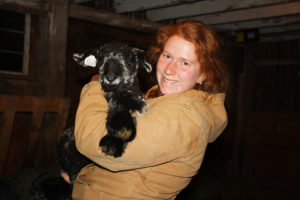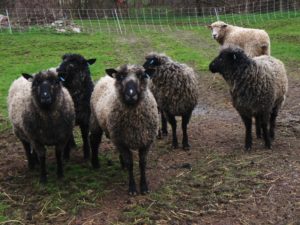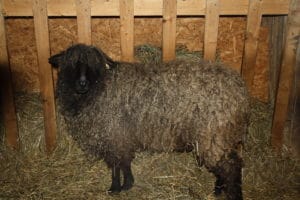Counting Our Blessings
Lessons Learned from Raising Heritage Lincoln Longwool Sheep.
By Emmaline Long and David Popielinski
If you ask which life experiences have had the most profound impact on us, our answer may surprise you. “Sheep?” you would ask. “Why sheep?” Well, it all started with a Blessing in the form of a Lincoln Longwool sheep.
Blessing came to Dave Popielinski of Rocky Knoll Acres while he was in middle school through the Youth Conservationist Program, which encourages youth to raise rare heritage breeds of sheep. Little did we know she would indeed be a blessing to both of us. Emmaline Long of Orchard View Farm met Dave and Blessing at an agricultural fair in the fifth grade. She was so inspired that two years later, she purchased a pair of Lincolns to call her own. Thirteen years after Blessing connected us, Dave has 15 and Emmaline has 35 registered Lincoln Longwools.
Lincoln Longwools are a relatively large breed of sheep that was developed in the Lincolnshire region of England and was brought to the United States in the mid-1800s. While it is traditionally bred for its lustrous wool, the Lincoln is a multi-purpose breed that is large and heavily built. As with many larger breeds of animals, they are calm with a gentle disposition. Their fleece can either be white or natural colored (ranging from black to light charcoal) and is classified as coarse in texture. They have been a great breed for both of us and are the only breed that we raise.
As we have grown up over the past decade, our Lincolns have taught us a great many lessons we feel are good guidance for young farmers looking to partake in the many blessings that come from raising heritage farm animals.
1. Educate, educate, educate: Education in agriculture happens on many levels. We do our part by attending fairs, festivals and other small community events with our Lincolns, both around our communities in Western NY and throughout the Northeast. While questions about our “goats” can be as frustrating as they are amusing, attending these events is a great way for us to not only educate people about agriculture and sheep in general, but also to teach people about the unique nature of our heritage breed. Also, because our breed is so rare we have often walked into the show ring at fairs to find judges’ faces clearly begging the question, “What on earth is that?!” We’re no longer surprised at being the odd ones out at our local county fairs, and celebrate our animals’ rarity as an opportunity to educate those around us.
2. If at first you don’t succeed, try, try, try again: Placing last in anything is never easy, but it is probably the most motivating place to be in the show ring. We have experienced placing last at shows large and small, but over years of showing we have steadily worked our way up the line. When we started, neither of us had any idea how to get a sheep ready for show; how to wash it, condition it, trim it, and more importantly, how to breed our animals to improve our flocks. Neither of us claims to be an expert, but we’ve definitely come a long way.
3. Sometimes the people you meet along the way make all the difference: If there’s one thing that contributes more than the sheep themselves in making Lincolns a wonderful breed to raise, it’s the other people who raise them. The Lincoln breeders we show with from around the United States are some of the most encouraging and supportive people we have ever encountered. From the very first shows, when we were naïve rookies, to now as young adults striving to place better each year, they never fail to share their knowledge and help us become better herdsmen. Our Lincolns have taught us to always surround yourself with positive people who share their experiences and encourage you in yours.
4. Sheep will find every burdock in the field: If there’s one thing we have learned about raising a wool breed of sheep, it’s that no matter how much time you spend in the pasture digging up burdocks, thistles, and other troublesome weeds, your sheep will always manage to find the one you miss. And good luck getting that out later… They’re a bit like we were growing up: always managing to get ourselves in a little bit of trouble that we would have to work ourselves out of later. Man or beast, it seems that we all have a burdock stuck to us at some point in our lives.
5. Responsibility: Our Lincoln sheep started out as 4-H projects for us, so right from the beginning our parents made sure that we were the ones feeding them, cleaning the pens, and assuming full responsibility for all sheep-related tasks and disasters. At the age of 12, this was not an easy task. It’s also not easy doing midnight and three a.m. checks on school nights, helping a mother give birth, and nursing a cold lamb back to life at -10° F. But we have done all those things, and through them we have been instilled with a sense of responsibility.
6. Patience is a virtue: Raising animals can be trying, and sheep are as stubborn as they come. We’ve both had our share of sheep-related temper tantrums, but as with most situations in life, frustration doesn’t accomplish anything. We believe sheep can sense their shepherd’s negative emotions and will purposely encourage frustration when they detect it. When you say “go left,” they go right. When you repair the fence in one spot, they find the next convenient hole. Winning the battle is difficult, especially when you are contending with a 300 pound ram. We have learned that calm and patient work can mollify even the most exasperating of sheep, as well as most obstacles faced in raising animals.
7. Following the leader can get you into trouble: Sheep are flock animals. They strongly dislike being alone and will do anything – ANYTHING – to stay with their friends. There is no rhyme or reason to the decisions they make, but they always do the same thing. If one decides to go outside, they all go outside. If one decides to eat hay, they all get up and eat hay. Their game of “follow the leader” is quite humorous, actually, and blatantly evident in the one little path stretching from barn to pasture.
While this is evolutionarily a defensive survival tactic for sheep, it often seems to get them into just as much trouble as it helps them. So, when one gets stuck in a fence, so do a few others. After spending enough time with the Lincolns, we realized it’s the same with us. During middle school, high school and throughout life, it is so easy to just follow everyone else without paying mind to the possible outcomes. As with sheep, this often gets you into trouble. We’ve learned this the hard way. The road to individuality is oftentimes much harder and less traveled, but we have found in the end it is infinitely more rewarding. Be a leader and make your own path into the pasture.
8. Don’t forget to count your blessings along the way: There is so much in life to be thankful for, yet so much is taken for granted. Blessing is the sheep that started it all for us: directly for Dave, and indirectly for Emmaline. Along the way we’ve had our share of trials – lost lambs, sick sheep, disappointment from placing last in a competitive show- but it has always been important to pay attention to the little things like an energetic lamb, the excitement of sheep when you walk into the barn (even if all they want from you is food) and placing higher at a show than you did last year. In this modern world of instant gratification, lightning fast technologies, and drive-through everything, it is easy to lose focus of what is most important. We have learned to pause and take the time to appreciate the small, seemingly insignificant things in daily life. We now realize the littlest things are usually the biggest blessings.
What started as one Blessing in the form of a sheep has since multiplied into many more that have shaped us into who we are today. Blessing has since passed away, but the gifts she passed onto us will last a lifetime. Even though we are still finishing college and trying to figure out our plans in the grand scheme of life, we both know, without a doubt, that Lincoln Longwool sheep will continue be a part of our future.
David Popielinski has been raising his Lincolns at Rocky Knoll acres in Alden, NY since middle school. He can be reached at dlpopielinski@yahoo.com.




